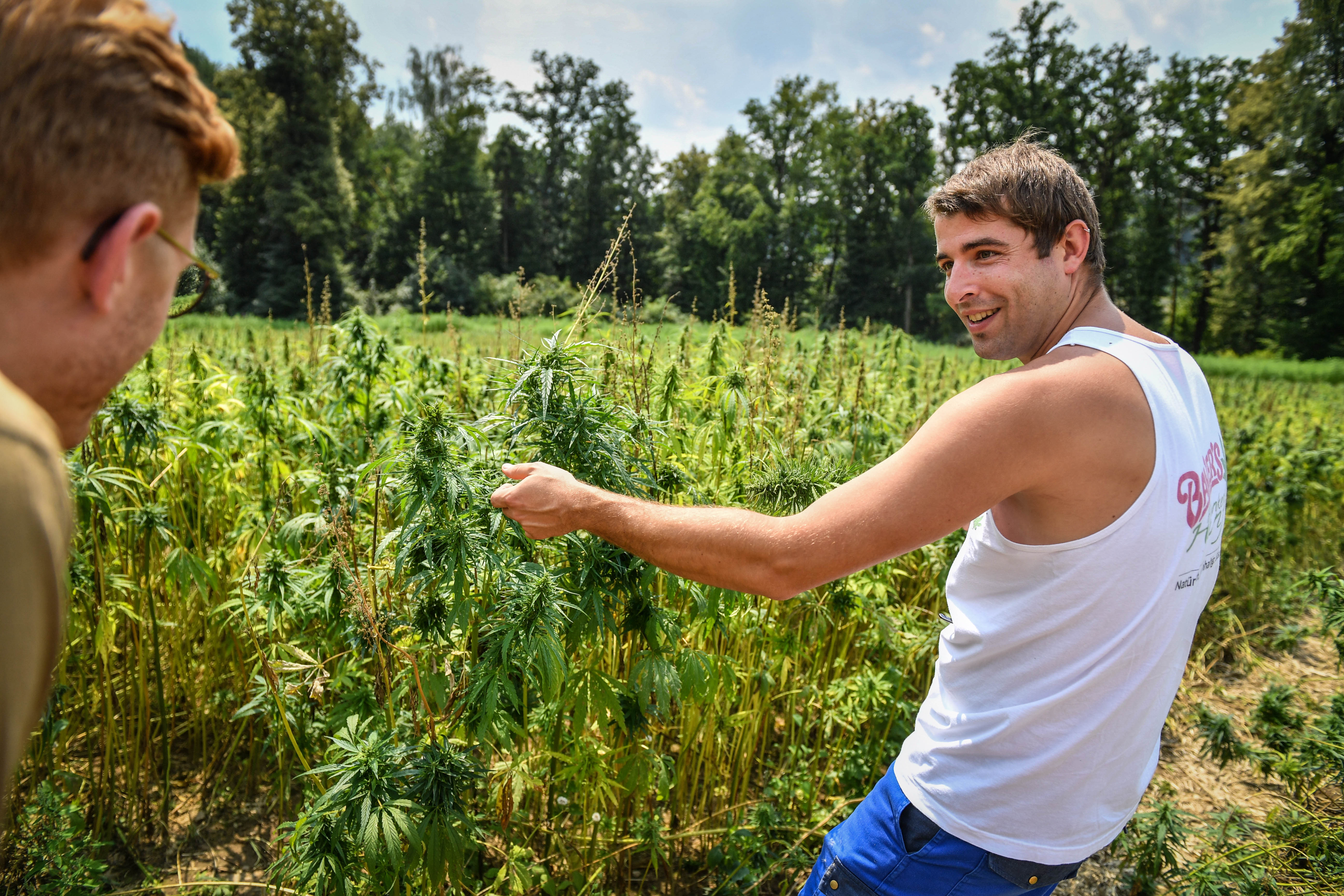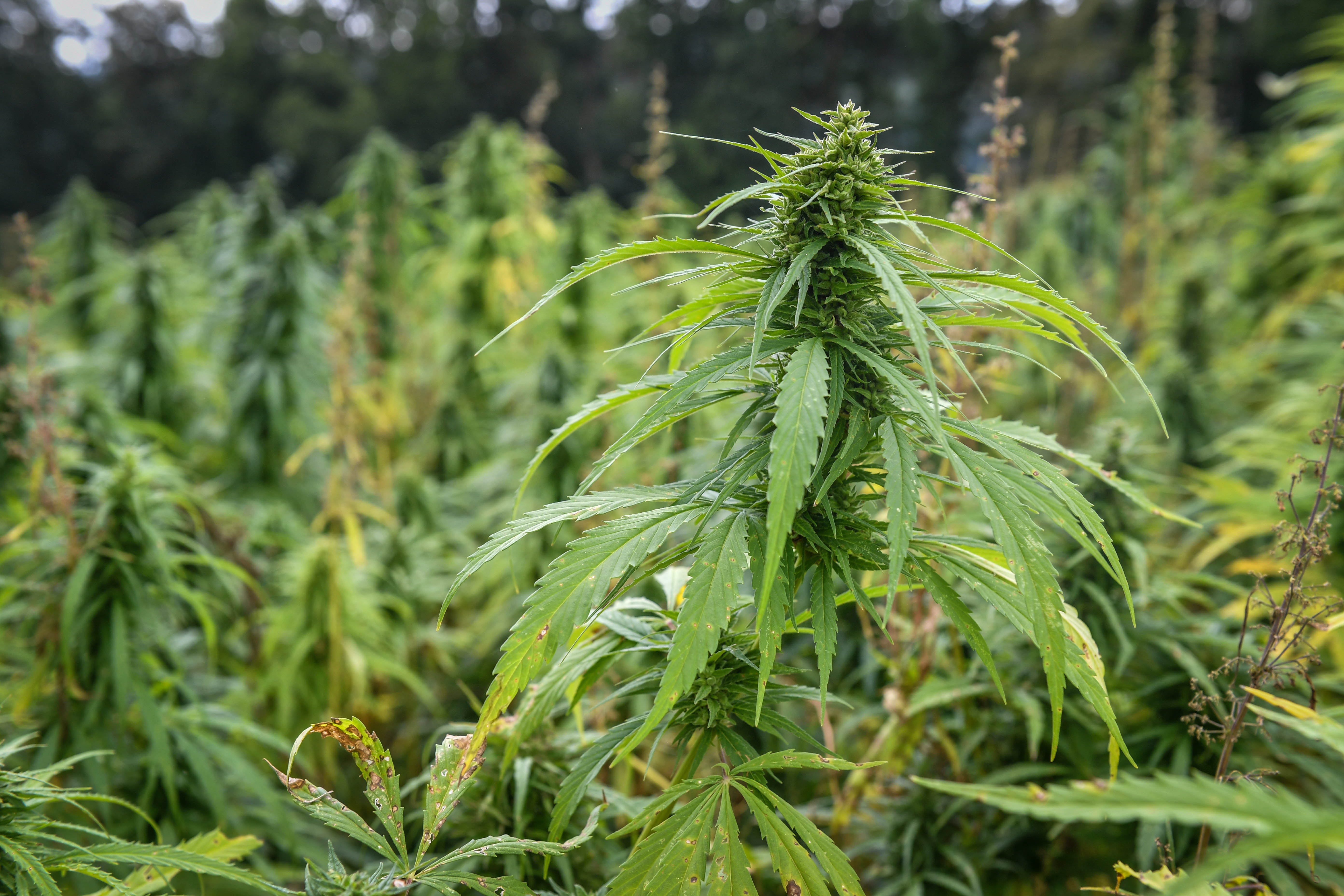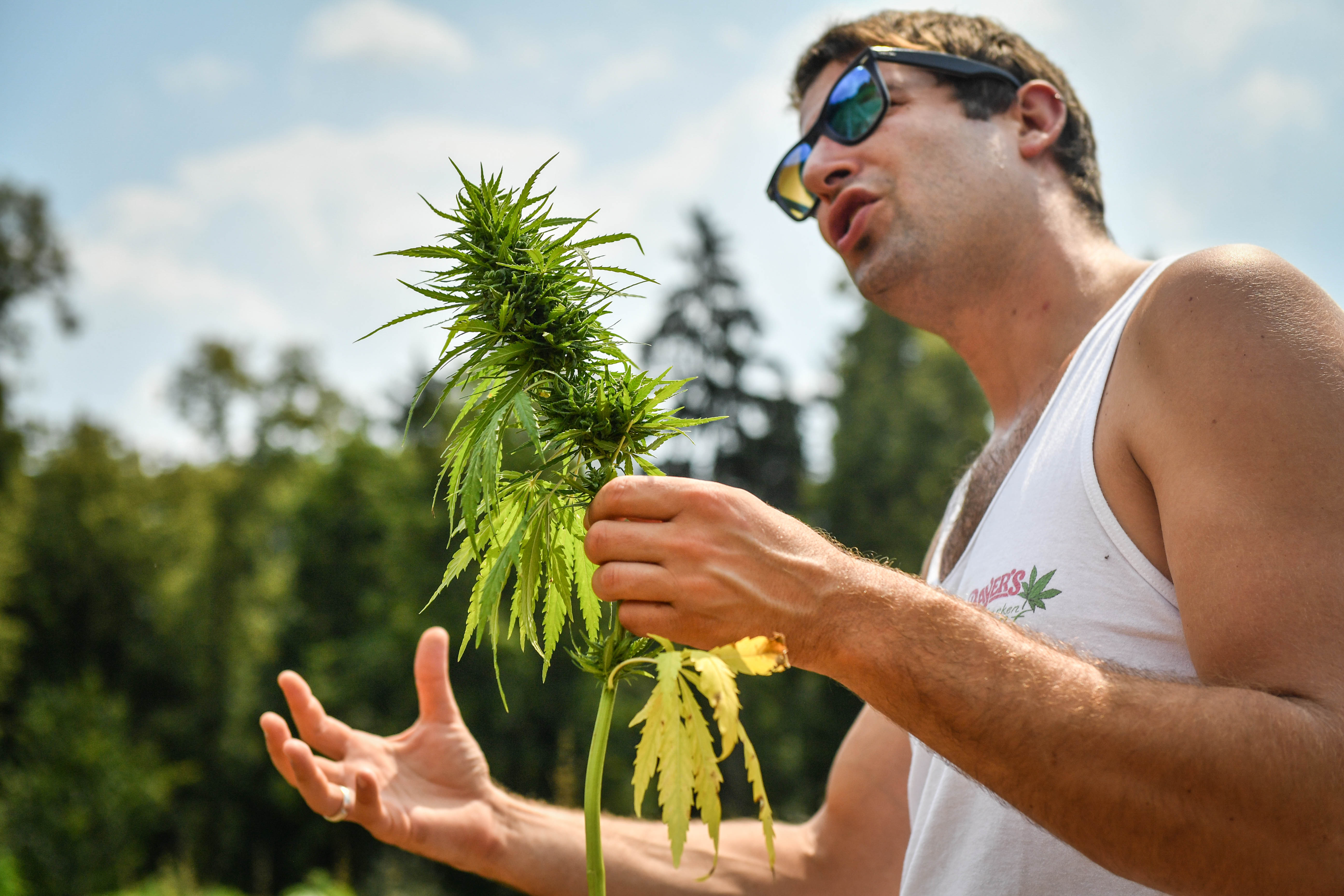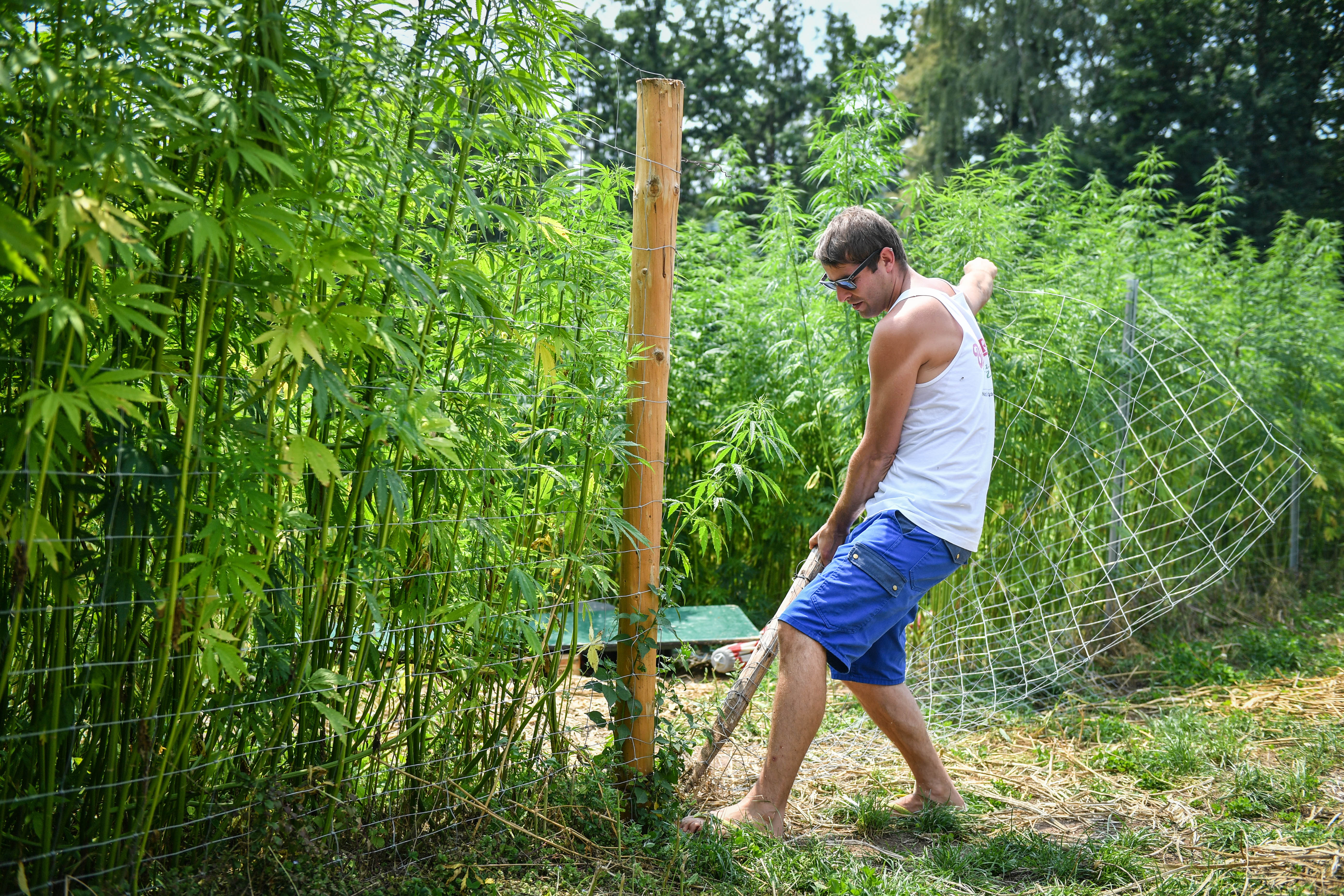A Tour of Germany’s First Pick-Your-Own-Plant Hemp Farm
This article originally appeared on VICE Germany.
Joe Bayer rips three meter [nine feet]-high plants from the ground with such fervor, you’d think he’s expecting to find crude oil under the roots. A few moments later, as he roams around guiding me through his hemp farm, he’s expressing such wonder and awe that it’s clear even he can barely believe it exists, and it’s his. “It’s crazy, isn’t it?” he asks me.
Bayer’s hemp farm stretches across nearly four acres of land—about the size of three soccer fields. His parents’ home stands on a hill overlooking the fields. From there, they have a great view of what their son is up to. And that’s cultivating Germany’s first self-picking hemp field—a green and pleasant land where hemp enthusiasts can pluck and purchase as much unprocessed product as they desire.

For the past three decades, Bayer’s family has lived here near the Bavarian town of Kronach in southeastern Germany—picking and selling strawberries from their nearly 200 acres of land. In the summer, they employ 500 people. Their customers can either buy a batch of strawberries from one of the family’s concession stands, or head directly to the farm to pick their own fill of fruit. If anything, Bayer is carrying on the family tradition, albeit with hemp.
“People often think hash and hemp are the same thing,” Bayer tells me. “But the difference is that one gets you high and the other doesn’t,” he adds. It’s a distinction he has had to repeat many times, especially to his parents.
At 17, Bayer was arrested for possessing €20 [$23] worth of weed, and was ordered to do 80 hours of community service. For three weeks, he didn’t dare go home and face his parents. “My parents thought I was a drug addict who needed help.”
Since childhood, Bayer has suffered from Irritable Bowel Syndrome (IBS)—a chronic condition that affects the digestive system and can cause symptoms such as severe stomach cramps. “My stomach feels like it’s on fire,” he explains, adding that stress, long working days, and hot temperatures can often make it worse. For years, he was constantly in and out of hospitals, trying out new drugs to help manage his IBS.
That was until 2015, when he stumbled on a potential cure as he was searching for alternate medications. Bayer had heard cannabidiol (CBD) could be used to treat inflammations, so he ordered some online. Soon after testing it out, his IBS eased—his cramps became more manageable and his inflammations subsided. Bayer didn’t tell his parents until a doctor prescribed him some CBD in 2017. Bayer’s parents could clearly see how far the CBD had gone in helping their son, so not only did they approve of its use, but they leased him some of their land to grow a farm of his own.

Two months ago, Bayer planted 43kg [95lbs] of hemp seeds. Today, lush hemp bushes bulge under the sun. Along the roadside near the farm, there are tall “Santhica 27” plants, and behind them some “Finola“—the most CBD-rich of all the EU-approved hemp strains. It smells as woody and earthly as you can get. “You can read notes of pine, moss, and grass,” Bayer explains, like a cannabis sommelier. “And a hint of sweet peach, too. All this without fertilizer—my dad didn’t believe this would be possible without fertilizer.”
As he zigzags across his field like an overexcited puppy, Bayer tries to explain to me how different elements influence the quality of his crop, but the technicalities are hard to follow. In any case, what he’s doing is working—earlier today, the latest chemical analysis of his plantation confirmed that his crop contained 0.17 percent of THC, which is just under the legal 0.2 percent threshold for the main psychoactive component of cannabis.
“Even when I’m not out in the field, all I think about is hemp,” Bayer tells me. What occupies his mind at 3 AM when he wakes up, isn’t just how to make the most of it—tea, oils, creams—but also “why the police are on my back.” In early July, the local council granted Bayer permission to harvest his hemp farm. Not long after that, a few friends, family members, and interested neighbors started coming over to pick their own hemp. But a few weeks ago, Bayer received a call from the local police, questioning his permit. If they found him guilty of operating without a proper license, Bayer could be prosecuted on drug charges for supplying. He isn’t angry at the police for the confusion, but blames Germany’s complicated laws governing the use of CBD.

CBD products are legal in Germany, as long as the THC content is lower than 0.2 percent. That Bayer cannot simply sell his plants to his customers is a result of a recent amendment to the country’s Narcotics Act. According to the act, a person can only handle unprocessed hemp if it serves “exclusively for commercial or scientific purposes, which exclude an abusive or intoxicating purpose.” That means that Bayer has to be sure that his customers or third parties don’t get high on his crops.
With a maximum THC threshold of 0.2 percent, that is almost certain, but not guaranteed. Technically, you could boil the hemp in large quantities of alcohol to separate it and extract the THC. But even if you went to those lengths, Bayer explains, you’d only manage to get it up to 0.5 percent potency.
Simply finding the nearest dealer is easier and cheaper. Nevertheless, for now, Bayer is only allowing customers with a business license to trade hemp to pick and purchase from him—such as the tea producer who recently bought 3kg [6lbs] for €30 [$35] Euros. But because the authorities know very little about CBD, those 3kg [6lbs] of hemp never made it into teabags.
Bayer recently received a call from a narcotics officer in Bayreuth, who had found the 3kg [6lbs] in a house search, and asked Bayer what he knew about it. After Bayer confirmed that he sold “EU-approved hemp to traders, properly weighed, with receipts and proven tax,” the officer still wasn’t satisfied, accusing Bayer of selling weed illegally. Bayer went on to explain the difference between the potency of hemp and other strains of cannabis, but the police officer wasn’t having it.

Farmers have been able to grow hemp legally in Germany since 1996. The industry processes it into renewable plastics, paper, and clothing. “Hemp is used to make more fibers and less resin, so lawmakers don’t want you to make CBD oil, creams, and teas,” Bayer explains. Because he wants to give his plants directly over to his customers, he has had to take on a lawyer. After an investigation on his business, he should be able to secure his dream of legally harvesting a farm where anyone can grab as much hemp as they need. From there, Bayer can process it into whatever his clients want. “There are so many possibilities,” he says, as he locks the gate leading into his field.
As he pours out cold hemp lemonade in the strawberry farm break room, Bayer outlines how he thinks his farm can be utilized to help patients suffering from severe conditions. A friend of his, for example, is fighting some of the effects of cancer with CBD. A treatment like this can potentially be used in the future to treat cancer, is not just the empty talk of a guy who wants to shift 13 tonnes of hemp from his field, but also an opinion shared by the US government, which published a recent study that said that cannabinoids were able to stop the growth of some cancer cells in rats.
As his six-year-old daughter darts between our feet, Bayer speaks of his future hempire, which he plans will eventually feature bars and restaurants. “I once had a tick,” his daughter suddenly announces. “And what do we put on the tick bite?” Bayer asks her. “Hemp oil,” she replies. Even his father, Bayer says, now has salads and pesto made of hemp, and drinks hemp tea.
Recently, Bayer was in Berlin, on the city’s RAW party strip. He felt uncomfortable when he was between the weed dealers and the revelers looking to buy from them, he says. That is not his world. In his world, Bayer sits at his desk on a hill, surrounded by hemp. When people come to harvest from his field, they can do what they like with what they pick. “Just like strawberries.”
Sign up for our newsletter to get the best of VICE delivered to your inbox daily.
This article originally appeared on VICE DE.